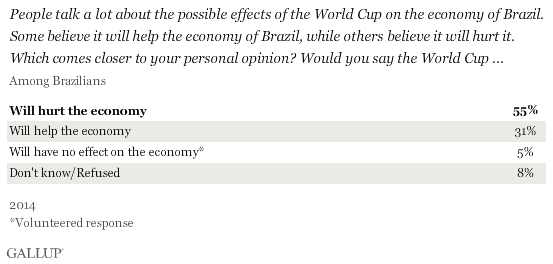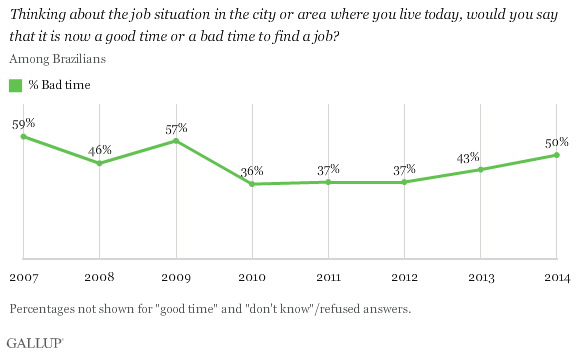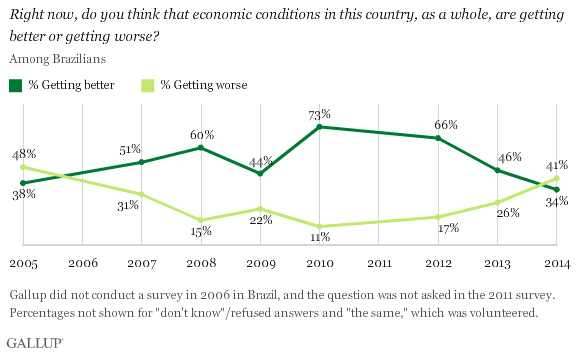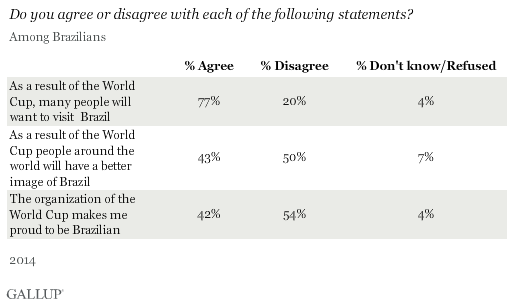| 작성자 : 라키스 | 작성일 : 2014-07-23 11:17:05 | 조회수 : 1,998 |
| 국가 : 브라질 | 언어 : 한국어 | |
| 원문링크 : http://www.emerics.org/lac/newsbrief/daily.do?action=detail&brdctsno=142562 | ||
| 구분 : 사회문화 | ||
| 출처 : emerics | ||
| 발행일 : 2014-06-09 | ||
|
원문 제목: Majority of Brazilians Expect World Cup to Hurt Economy 원문 링크: http://www.gallup.com/poll/172091/majority-brazilians-expect-world-cup-hurt-economy.aspx
WASHINGTON, D.C. -- Brazilians' hopes are likely high Friday as their national team faces Colombia in the quarterfinals of the World Cup. Shortly before the tournament began, however, the Brazilian public was rather skeptical about the economic benefits of hosting the most expensive World Cup in history. In May, 55% of Brazilians said the World Cup will hurt the Brazilian economy, while 31% believed that it will help.
Brazilian government officials proudly proclaim that by hosting the World Cup, the Brazilian economy has added 1 million jobs. But Brazilians' perceptions of the job market are at odds with these claims, having soured significantly since 2012. Half of Brazilian adults now say that it is a bad time to find a job, up from 37% in 2012. Some pundits doubt that the World Cup can create many permanent jobs. Moreover, overall job creation in May was the lowest for that month in more than two decades, according to a recent report from Brazil's Labor Ministry.
Economic Outlook Increasingly Pessimistic
Brazilians are also becoming increasingly pessimistic about their country's economic outlook. For the first time since 2006, they are more likely to say economic conditions in Brazil, as a whole, are getting worse, than to say they are getting better (41% vs. 34%). Economic optimism was even higher in 2008 and 2009 when Latin America's largest economy was struggling to contain the effects of the global economic crisis, which it weathered better than many other economies in the end. However, Brazil's economy started to lose steam in 2011, and slow growth continued into the first quarter of 2014 when GDP rose by 0.2%. Some economists also blame the estimated $11.3 billion spent on infrastructure ahead of the World Cup for Brazil's economic woes because it fueled inflation, which in turn is eroding purchasing power and business confidence.
Minority Believe World Cup Will Improve Country's Image
Allegations of corruption and mismanagement help explain why a minority of Brazilians agree that the organization of the World Cup makes them proud to be Brazilian (42%). Moreover, 43% believe the World Cup will improve their country's image. Stories abound about how the costs to construct some stadiums tripled and about how construction companies contributed large sums to political campaigns. Furthermore, many infrastructure projects were not ready in time. Still, most (77%) are convinced that many people will want to visit Brazil as a result of the World Cup. An estimated 600,000 international tourists are visiting the country's 12 host cities during the event.
Discontent with the organization of the World Cup, worries about the state of the Brazilian economy, and general discontent with the national government appear to be a drag on President Dilma Rousseff's approval rating, which is at a historical low (44%). Nevertheless, a few weeks before the World Cup, Rousseff was still the undisputed front-runner for the presidential election on Oct. 5. Among Brazilians who declared their intentions to turn out at the ballot box, 37% said they will vote for the incumbent. Few potential voters intended to vote for any of Rousseff's major challengers: Aécio Neves (8%), Eduardo Campos (5%), or Randolfe Rodrigues (1%). However, with about four in 10 (41%) potential voters still undecided and three months until the elections, the race is far from over.
Implications
Ahead of the World Cup, Brazilian discontent abounded. So far, fears of large-scale protests and infrastructure problems have not disrupted one of the world's most popular sporting events. And while the tournament will keep Brazilians in suspense for a little longer, in October they may re-evaluate the long-term consequences of hosting the most expensive World Cup in history.
For complete data sets or custom research from the more than 150 countries Gallup continually surveys, please contact us.
Survey Methods
The latest results are based on face-to-face interviews with 1,007 adults, aged 15 and older, conducted from May 1-May 25, 2014 in Brazil. Previous waves of data collection took place in November 2005, August 2007, September-October 2008, August-September 2009, August 2010, December 2011, March-June 2012, December-January 2012 and 2013 and September-October 2013. The data of the two waves from 2012 has been combined for this article. The first wave in 2012 is the only wave that was conducted by telephone.
For results based on the total sample of national adults, one can say with 95% confidence that the maximum margin of sampling error is ±3.5 percentage points. The margin of error reflects the influence of data weighting. In addition to sampling error, question wording and practical difficulties in conducting surveys can introduce error or bias into the findings of public opinion polls. |
||
| 이전글 | 베네수엘라 마두로 대통령 미국에 대해 “평화를 위한 고위급 위원회”설립을 제안 |
|---|---|
| 다음글 | 에콰도르의 코레아 정부는 좌파인가? 중도좌파인가? |






